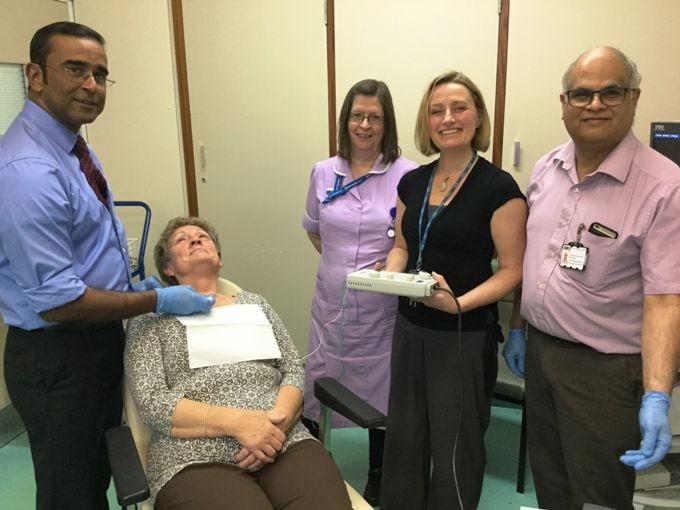PATIENTS living with a poorly understood chronic voice disorder which causes involuntary muscle spasms, impairing speech and swallowing, can now receive treatment nearer to home thanks to the launch of a specialist multidisciplinary clinic at Sheffield Teaching Hospitals NHS Foundation Trust.

The laryngeal dystonia team at the Royal Hallamshire Hospital From left to right: Professor Jaydip Ray, patient Margaret Loveday, staff nurse Linda Drabble, speech and language therapist Karen Esposito and consultant neurophysiologist Dr Ganesh Rao
The laryngeal dystonia clinic – the first of its kind in Yorkshire – sees and treats patients suffering with debilitating speech and swallowing impediments from dystonia with a combination of voice therapy and Botox-like injections. Previously patients needing this treatment had to travel as far afield as Manchester, Middlesbrough or Brighton for this service.
Laryngeal dystonia or voice dystonia is a frustrating speech disorder where the muscle tone in the voice box alters, causing involuntary sustained muscle contractions, and a tight, strangled or breathy sounding voice quality, often with abrupt starting and stopping of the voice.
The rare neurological disorder significantly reduces the quality of a person’s life, impairing their ability to eat, drink and talk. The exact cause of the disorder is unknown – but incorrect messages being sent from the brain to the muscles are believed to trigger the involuntary spasms in the throat. This trigger could be linked to ill health, stress or a traumatic life event.
Patients referred to the service from hospitals across the region including Barnsley, Chesterfield, Doncaster, Rotherham, Goole, and Grimsby are assessed at a monthly clinic by a team of speech language therapists, ear, nose and throat specialists and neurophysiologists.
Depending on their needs, patients are then either offered a course of botulinum toxin injections, which can be given straight away in the clinic, or are referred for further speech language therapy support. This could include special voice strengthening exercises and reflux management. The botulinum toxin injections need to be repeated every three months as these temporarily relieve symptoms by weakening or paralysing the affected area.
Professor Jaydip Ray, Clinical Director and Consultant Ear, Nose and Throat Surgeon at Sheffield’s Royal Hallamshire Hospital, said:
Patients suffering with laryngeal dystonia have an absolute miserable existence as they know what it is happening to them, and as well as the practical limitations of this condition it’s terribly frustrating not being able to get your voice out. Patients in the area previously had to travel huge distances to receive treatment, compounding the frustrations of an already burdensome disorder, so we are delighted to be the first NHS Trust in Yorkshire and one of only a few in the country to provide this specialist multidisciplinary service. Sheffield Teaching Hospitals has a wealth of expertise in providing excellent ear, nose and throat and neurological care to patients across the region, and many patients seen by the service will be given treatment straight away which is fantastic news.
Ann Valentine, 59, from Hillsborough, says that she “felt like a freak” when she first started to suffer with laryngeal dystonia. “In the beginning it was devastating and it made me feel very lonely. I’d never heard anyone sound anything like me. I thought I must have cancer or something. It changed me completely.” An outgoing person normally, Ann, who works as a manageress in a florist shop, found it frustrating having to answer the phone and dealing with awkward looks from customers and colleagues.
“When a new member of staff joined, I’d have to explain that something wasn’t quite right. It made me feel very frustrated and angry.”
But since coming to the Royal Hallamshire Hospital’s specialist laryngeal dystonia clinic for Botox-like injections and voice therapy, she’s seen a big improvement in her confidence.
“The new procedure has been brilliant. It hurts for a split second, but everybody has noticed the difference in me. I sing through the day and I love answering the phone at work now. The speech language therapists at the Royal Hallamshire Hospital have been a huge support throughout the years, and I won’t have got to where I am without their support.”
Margaret Loveday, from Grimsby, added:
The treatment I have received has changed my life for the better. It makes communicating with people easier and gives me more confidence to talk with people.
I am less anxious about people looking at me because of my head tremors. That used to stop me from wanting to do things, like going to the theatre. I love the theatre but I used to sit at the back because I felt self-conscious about it, but now I can sit anywhere without worrying.
It really has transformed a lot of my life and I shall be forever grateful to the team that looks after me and the wonderful NHS.